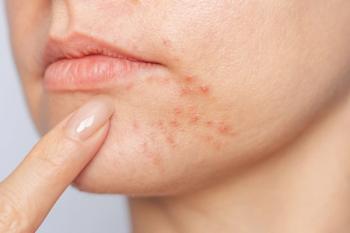
Dermatologists Now Have Access to First Treatment Option with Proven Efficacy in Facial and Truncal Acne
Sponsored by
Acne, the most common skin condition in the United States, affects up to 50 million Americans annually and approximately 85% of teenagers and young adults.1 While facial acne (forehead, cheeks, nose and chin) is the most common and often the most visible presentation of the disease, more than half of individuals with facial acne (52%) also have truncal acne (chest, shoulders and back).2
While retinoids have long been considered the gold standard for treating acne because of their ability to regulate skin cell turnover and their comedolytic and anti-inflammatory properties, there had been little innovation in the field in decades until recently.3 Furthermore, no retinoids had been proven in clinical studies to be effective and safe to use on the trunk in addition to the face.
In October 2019, the U.S. Food and Drug Administration (FDA) approved the first topical treatment specifically studied and proven safe to treat both facial and truncal acne, offering healthcare professionals a treatment option for their patients with acne.4 AKLIEF® (trifarotene) Cream, 0.005%, indicated for the topical treatment of acne vulgaris in patients age 9 years and over, is also the first new retinoid to receive FDA approval for the treatment of acne in more than 20 years.5,6,7 This unique, highly targeted retinoid has been demonstrated to reduce inflammatory lesions on the face, back, chest and shoulders and to be safe and well tolerated.
Trifarotene is the only topical retinoid that selectively targets retinoic acid receptor (RAR) gamma, the most common RAR found in the skin.3,4,8 The highly RAR-gamma-selective retinoid allows for strong activity in the skin, resulting in low systemic exposure. The exact process by which trifarotene ameliorates acne is unknown.
The FDA approval of AKLIEF Cream was supported by data from pivotal Phase 3 clinical trials of once-daily AKLIEF Cream in patients with moderate acne on the face and trunk, including two 12-week trials of efficacy and safety and one 52-week safety trial.4 The two identical 12-week, randomized, multicenter, parallel group, double-blind, vehicle-controlled clinical trials of 2,420 patients showed that AKLIEF Cream significantly reduced inflammatory lesions as early as two weeks on the face and four weeks on the back, shoulders and chest compared to vehicle (p<0.05). AKLIEF Cream was well tolerated when used on the face, back, shoulders and chest. The most common adverse reactions (incidence >1%) included application site irritation, application site pruritus (itching) and sunburn.
While many people experience acne well into adulthood, adult-onset acne is becoming increasingly common in women in their 20s and beyond.9,10 Moreover, truncal acne, once thought to be a predominantly male disease, has been shown to be prevalent in females.2 These patients need a topical treatment regimen that is effective in treating not just the face, but the chest, back and shoulders as well. AKLIEF Cream, an innovative treatment option for acne and the first topical treatment specifically studied and proven safe and effective for both facial and truncal acne, may be an appropriate option for these patients.
For more information, visit
Important Safety Information
Indication: AKLIEF® (trifarotene) Cream, 0.005% is a retinoid indicated for the topical treatment of acne vulgaris in patients 9 years of age and older. Adverse Events: The most common adverse reactions (incidence ≥ 1%) in patients treated with AKLIEF Cream were application site irritation, application site pruritus (itching), and sunburn. Warnings/Precautions: Patients using AKLIEF Cream may experience erythema, scaling, dryness, and stinging/burning. Use a moisturizer from the initiation of treatment, and, if appropriate, depending upon the severity of these adverse reactions, reduce the frequency of application of AKLIEF Cream, suspend or discontinue use. Avoid application of AKLIEF Cream to cuts, abrasions or eczematous or sunburned skin. Use of "waxing" as a depilatory method should be avoided on skin treated with AKLIEF Cream. Minimize exposure to sunlight and sunlamps. Use sunscreen and protective clothing over treated areas when exposure cannot be avoided.
You are encouraged to report negative side effects of prescription drugs to the FDA. Visit
©2020 Galderma Laboratories, L.P. All Rights Reserved. All trademarks are the property of their respective owners.
References:
1. American Academy of Dermatology. Acne.
2. Del Rosso JQ, et al. A closer look at truncal acne vulgaris: prevalence, severity, and clinical significance. J Drugs Dermatol. 2007; 6:597-600.
3. Aubert J, Piwnica D, Bertino B, Blanchet-Réthoré S, Carlavan I, et al. Nonclinical and human pharmacology of potent and selective topical retinoic acid receptor-γ agonist trifarotene. Br J Dermatol. 2018;179:442-456.
4. Tan J, Thiboutot D, Popp G, Gooderham M, Lynde C, et al. Randomized Phase 3 evaluation of trifarotene 50 μg/g cream treatment of moderate facial and truncal acne. J Am Acad Dermatol. 2019. DOI:
5. British Association of Dermatologists. Topical trifarotene: a new retinoid. Br J Dermatol. 2018;179:231-232.
6. Data on File, Galderma.
7. FDA PPI, Galderma.
8. Fisher GJ, et al. J Biol Chem 1994;269(32):20629-35.
9. American Academy of Dermatology. Adult acne.
10. American Academy of Dermatology. Hormonal factors key to understanding acne in adult women.
Newsletter
Like what you’re reading? Subscribe to Dermatology Times for weekly updates on therapies, innovations, and real-world practice tips.












